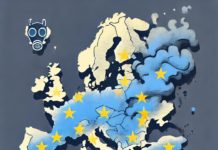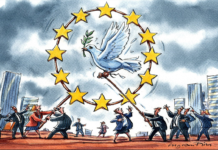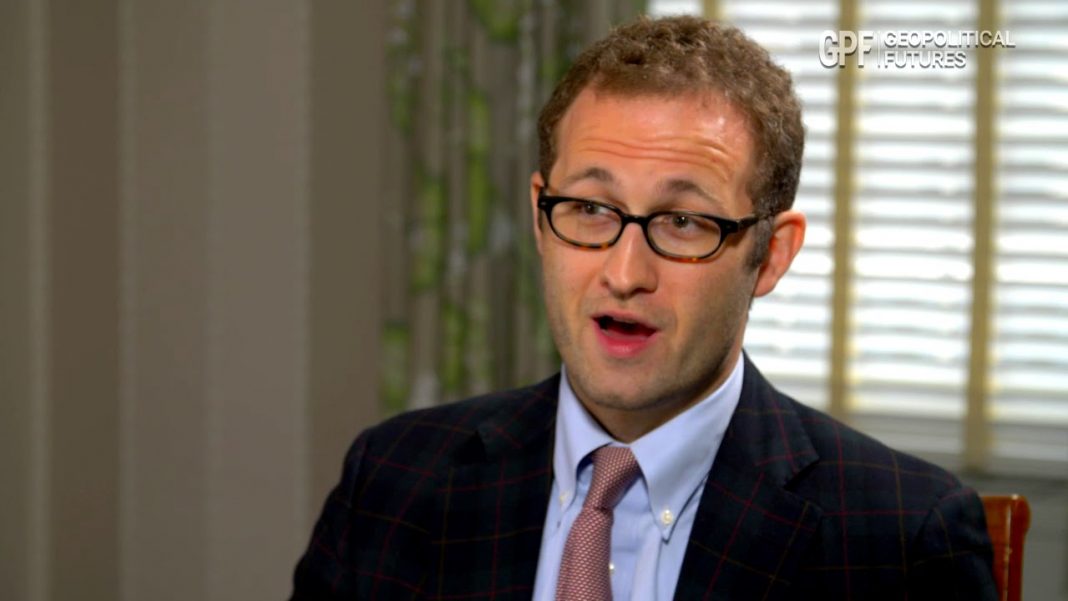Jacob L. Shapiro is a geopolitical analyst and the Director of Analysis for Geopolitical Futures, a company founded in 2015 by George and Meredith Friedman. Mr. Shapiro is a regular speaker for publications such as MSNBC, CNBC, the New York Times and Fox News. He holds a bachelor’s degree from Cornell University in Near Eastern studies and a master’s degree from Oxford University. In this interview with 45north, Mr. Shapiro explores some defining trends for the future of Eastern Europe and the world at large.

45north: The demographics of Eastern Europe unfortunately register the largest population loss in modern history. The general factors blamed for this decline are falling fertility rates, emigration and high mortality. How do you think this decline will affect the regional geopolitical equation and what do you think we (Eastern Europeans) should do about it?
Jacob Shapiro: In 1968, a Stanford biologist named Paul Ehrlich wrote a book called “The Population Bomb,” in which he wrote that humanity was on the verge of apocalypse because of population explosion. Now, popular media would have us believe that even though the massive increase in global population in the 20th century did not have the predicted destructive effects, we should now believe that population reduction will destroy the world. The demographic issue here does not belong to Eastern Europe alone – Russia, China, Japan, Germany, and many others face the same issues and in some cases with more severity.
The issue boils down to two questions. First, can economic planning prevent GDP from falling faster than population? If it can, then the per capita wealth of individuals might go up. Japan is an excellent model for this. Second, does the decline in population suggest a crisis of confidence about the future that is causing would-be parents to decide not to have children? Or that young people feel life is better elsewhere? If so, then this is a psychological problem, and Eastern Europe should set itself the task of emancipation from the pessimistic worldview its history has imposed. There is tremendous opportunity to be had in Eastern Europe, but oddly enough this seems to be more widely accepted outside the region than inside the region.
45north: In terms of the geopolitical outlook of the region, you have predicted that Eastern Europe will see a revival and morph into a more cohesive bloc, in the face of common interests and threats. How do you think that the rather fragmented approach towards Russia between Eastern countries will affect this prediction?
Jacob Shapiro: I think the revival is at hand – we do not have to speak of the future to see that Eastern Europe is the most dynamic area on the European continent, both in terms of quantifiable things like GDP growth and more intangible things like creativity. It has only been 27 years since the collapse of the Soviet Union. The human energy that collapse created has only just begun to be felt in Eastern Europe. As for becoming a cohesive bloc, it is more complicated than that. I have also said that nationalism is increasing, and just as Brussels cannot presume to speak for all the interests of EU member states, neither can any single Eastern European country speaks for the interests of all Eastern European countries.
Even so, Eastern European countries face certain challenges in common. Russia is weakening but is still very much a threat. Germany is struggling to hold the EU together – and that makes Germany very much a threat. And we can see Turkey is just beginning to get used to its own strength and its relationship with Europe is increasingly tense. Individual countries may well deal with these issues in different ways, but the threats are the same, and none of the Eastern European countries want to go back to being dominated by outside powers. In the face of these threats I think you will continue to see an alignment at the foreign policy level, which may also spur closer national cooperation.
45north: In terms of economics, we are seeing an increasing rift between Eastern Europe and Western Europe, with the prospect of greater eurozone integration and a political drift of Eastern governments from Brussels. Where do you see this two trends leading Europe in the next decade?
Jacob Shapiro: Not enough of an economic shift. The biggest single threat to Eastern European countries is how integrated they currently are into the German supply chain. Consider the percentage of exports to GDP in the following countries: Poland (52 percent), Hungary (89 percent), Romania (41 percent), Estonia (79 percent). Political aspirations are one thing, but as we say in the United States, “follow the money.” If Eastern Europe continues to tie themselves to Germany and to model its economies after Germany, then there will be limits to how far these countries can drift from Brussels. Germany and France are pushing for greater Eurozone integration, and the economic incentive for Eastern European countries is very strong to fall in line with the demands of the center. Many think that economic integration in Europe only came after political integration.
I think this is a faulty way of looking at the matter. In the decades after World War II, western Europe became more economically integrated, and as a result, political institutions were created to reflect that underlying economic reality. What we have now is a political trend towards greater independence in Eastern Europe, but until that is joined by an equally powerful move to reduce dependence on the European economy, it will be of limited efficacy. So in the next decade I see the EU stumbling along, and a regional effort to reduce exposure to the Eurozone.
45north: With demographics pushing its weight again in international relations, Africa’s population increase and economic growth expected for the next 30 years will cause migration, nativism, multiculturalism and globalization to clash at Europe’s borders and in itself. How should Europe respond and how do you think it will affect the west-east divide?
Jacob Shapiro: How Europe interacts with those that are not European has always been difficult. Nationalism was born in Europe, and this creates a problem that countries like the United States and Australia don’t have: there is an inherent connection between nation and land that stretches back many centuries. Countries like the US and Australia are extremely young, and they are made up of settlers. The United Kingdom has always been an exception because it is a multinational kingdom made up of multiple nations – being “British” has a cosmopolitan quality that being “English” doesn’t, though Brexit showed us just how strong the national component is in the UK as well. We talked about demographics earlier – one way to solve the demographic issue is to welcome immigrants.
The issue then becomes integration. France and Germany are examples of a failure to integrate – think of the northern Africans in France or Turks in Germany. It makes Germany’s insistence on the refugee issue stranger. Eastern Europe arguably has an advantage here when it comes to political stability, because its populations are far more homogeneous than the Western European states. This of course creates divergences in East-West relations, and we have seen already how that plays out. The deeper question to ask is whether Eastern Europe can define a national culture that can incorporate outsiders into the nation, or whether this is incompatible with Eastern European conceptions of identity. I am not optimistic based on what recent history shows, but the ability to deal with these contradictions could be a powerful source of national power.
45north: Technology is obviously an underlining theme on the how the mechanics between Great Powers and nations in general, work. CRISPR, AI, quantum computing, cold fusion and many other cutting edge technologies have the potential to fundamentally change the current geopolitical status quo. What technology do you think will have the most impact on international relations in the coming three decades?
Jacob Shapiro: I would be lying to you if I said I knew what the next transformative technology is going to be. My approach to technology has always been to identify what it is that human societies need, because usually technological developments come from the areas that humans are concentrating the most resources. So the internet arises out of the need for secure and easy military communication. The atomic bomb arose out of decades of research into identifying new sources of fuel for a rapidly expanding world. Satellites arise out of the need to make munitions more precise. I look at the world today and I see nations funneling their resources at two main issues. The first is energy, and here we have already seen major advances.
Very few predicted that US shale producers were inventing technology and honing techniques that would make the US a net oil exporter and the largest oil reserves in the entire world. Whether in shale, solar, or advances in battery technology, energy is primed for a leap. The second is biotechnology. As we noted earlier, demographics show population decline in many advanced industrial economies. This means there is a lot of research into extending life spans or creating technology to take care of aging populations. I cannot pretend to pinpoint what the next transformative technology will be – perhaps it will be something altogether different, like missile defense – but my best guess is that it will come from the research into one of those fields, and that the impetus may come from some geopolitical necessity that is not yet visible to us.
I should also say that while technology has transformed the life of individuals, it very rarely shapes the balance of power between nations. Technology tends to change how nations interact moreso than geopolitical outcomes. Technology is the handmaiden of the nation, not a controlling invisible hand.





















